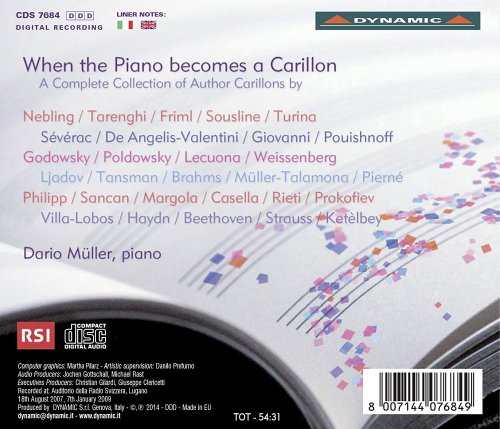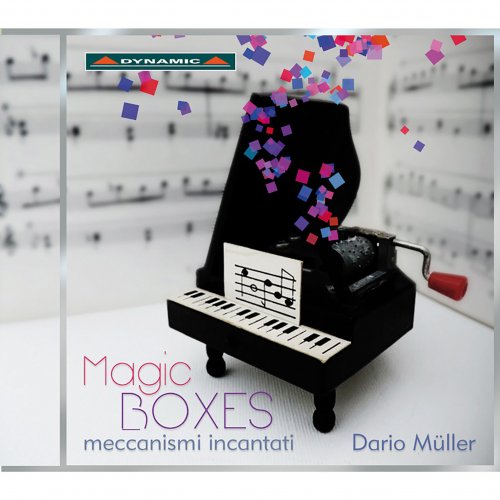
Dario Muller - Magic Boxes: Meccanismi incantati (2014)
BAND/ARTIST: Dario Muller
- Title: Magic Boxes: Meccanismi incantati
- Year Of Release: 2014
- Label: Dynamic
- Genre: Classical Piano
- Quality: flac lossless (tracks)
- Total Time: 00:51:52
- Total Size: 187 mb
- WebSite: Album Preview
Tracklist
01. Die Spieldose
02. Carillon, Op. 43, No. 1
03. Music Box, Op. 69
04. Musical Box I
05. Jardin de niños, Op. 63: III. Boite à musique (Musical Box)
06. Ou l'on entend unve vieille boite a musique
07. Carillon
08. Marie Antoinette's Music Box
09. The Musical Box
10. The Music Box
11. Musical Box II
12. Cajita de musica
13. Air d'enfant
14. The Musical Snuff-Box, Op. 32
15. Boite à musique
16. 25 Variations and Fugue on a Theme by Handel, Op. 24: Musette
17. Carillon I
18. Petite boite à musique
19. Tobatiere à musique, Op. 69
20. Boite a musique
21. Carillon II
22. Carillon, Op. 35
23. Il carillon scordato
24. Il carillon rotto
25. Visions fugitives, Op. 22: IX. Allegretto tranquillo
26. Caixinha de musica quebrada
27. Works for Flute Clock, Hob. XIX: No. 4, —
28. Works for Flute Clock, Hob. XIX: No. 21, —
29. Allegro in C Major for Mechanical Clock, WoO 33, No. 4 (Arr. for Piano)
30. Minuet in C Major for Mechanical Clock, WoO 33, No. 5 (Arr. for Piano)
31. Spieluhr Polka (Arr. O. Schulhof for Piano)
32. The Clock and the Dresden Figure (Arr. for Piano)

The sound world that is disclosed by opening a music box has always fascinated musicians. One wonders why so many artists have been attracted by the ethereal appeal of these small musical mechanisms invented three-hundred years ago; the answer, indeed, must lie in their imperceptible vibrations, their celestial sounds communicating tenderness and serenity, and evoking the reassuring atmosphere of childhood. Curiously, the sound of the carillon began instead to be imitated in works that took inspiration from fairy tales and legends, automatons, literary themes, or magical/surreal atmospheres. Various imitations of carillons were hence created through the expressive means of the piano. Among them there are simple motives (generally rêveries and berceuses) that are part of didactical collections destined for children, such as those by Alexandre Tansman, Paul Pierné, Irène Poldowski and Milo Giovanni; humorous and grotesque carillons, like those by Vittorio Rieti, Alfredo Casella, Heitor Villa-Lobos, Pierre Sancan, Rudolf Friml, Franco Margola and Enrico De Angelis-Valentini; and other pieces that reproduce the various tinkling sounds of music boxes, snuff-boxes and clocks, such as Emil Neblings Spieldose. In the classical and Biedermeier periods, clockwork musical instruments called Flötenuhr or Spieluhr made their appearance in central Europe. Consisting of a spiked drum, some wooden pipes, bellows and a clock, the Flötenuhr played a delicate and bright tune on the stroke of each hour, producing a magical atmosphere. Some musicians composed works for these mechanisms, among them Haydn and Beethoven. Our programme features four such pieces to exemplify this curious production. Also the Tic-Tac Polka from Johann Strauss operetta The Bat, here recorded in an arrangement for piano made by Otto Schulhof, is part of this musical genre, taking us back to the time of Viennas splendour.
01. Die Spieldose
02. Carillon, Op. 43, No. 1
03. Music Box, Op. 69
04. Musical Box I
05. Jardin de niños, Op. 63: III. Boite à musique (Musical Box)
06. Ou l'on entend unve vieille boite a musique
07. Carillon
08. Marie Antoinette's Music Box
09. The Musical Box
10. The Music Box
11. Musical Box II
12. Cajita de musica
13. Air d'enfant
14. The Musical Snuff-Box, Op. 32
15. Boite à musique
16. 25 Variations and Fugue on a Theme by Handel, Op. 24: Musette
17. Carillon I
18. Petite boite à musique
19. Tobatiere à musique, Op. 69
20. Boite a musique
21. Carillon II
22. Carillon, Op. 35
23. Il carillon scordato
24. Il carillon rotto
25. Visions fugitives, Op. 22: IX. Allegretto tranquillo
26. Caixinha de musica quebrada
27. Works for Flute Clock, Hob. XIX: No. 4, —
28. Works for Flute Clock, Hob. XIX: No. 21, —
29. Allegro in C Major for Mechanical Clock, WoO 33, No. 4 (Arr. for Piano)
30. Minuet in C Major for Mechanical Clock, WoO 33, No. 5 (Arr. for Piano)
31. Spieluhr Polka (Arr. O. Schulhof for Piano)
32. The Clock and the Dresden Figure (Arr. for Piano)

The sound world that is disclosed by opening a music box has always fascinated musicians. One wonders why so many artists have been attracted by the ethereal appeal of these small musical mechanisms invented three-hundred years ago; the answer, indeed, must lie in their imperceptible vibrations, their celestial sounds communicating tenderness and serenity, and evoking the reassuring atmosphere of childhood. Curiously, the sound of the carillon began instead to be imitated in works that took inspiration from fairy tales and legends, automatons, literary themes, or magical/surreal atmospheres. Various imitations of carillons were hence created through the expressive means of the piano. Among them there are simple motives (generally rêveries and berceuses) that are part of didactical collections destined for children, such as those by Alexandre Tansman, Paul Pierné, Irène Poldowski and Milo Giovanni; humorous and grotesque carillons, like those by Vittorio Rieti, Alfredo Casella, Heitor Villa-Lobos, Pierre Sancan, Rudolf Friml, Franco Margola and Enrico De Angelis-Valentini; and other pieces that reproduce the various tinkling sounds of music boxes, snuff-boxes and clocks, such as Emil Neblings Spieldose. In the classical and Biedermeier periods, clockwork musical instruments called Flötenuhr or Spieluhr made their appearance in central Europe. Consisting of a spiked drum, some wooden pipes, bellows and a clock, the Flötenuhr played a delicate and bright tune on the stroke of each hour, producing a magical atmosphere. Some musicians composed works for these mechanisms, among them Haydn and Beethoven. Our programme features four such pieces to exemplify this curious production. Also the Tic-Tac Polka from Johann Strauss operetta The Bat, here recorded in an arrangement for piano made by Otto Schulhof, is part of this musical genre, taking us back to the time of Viennas splendour.
As a ISRA.CLOUD's PREMIUM member you will have the following benefits:
- Unlimited high speed downloads
- Download directly without waiting time
- Unlimited parallel downloads
- Support for download accelerators
- No advertising
- Resume broken downloads


